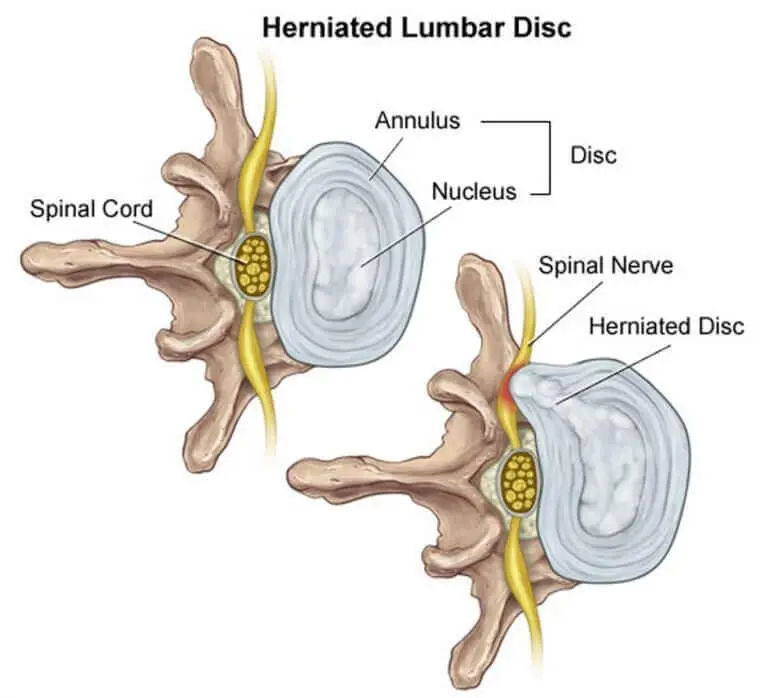What Is A Herniated Disc?
A herniated disk refers to a problem with one of the rubbery cushions (disks) between the individual bones (vertebrae) that stack up to make your spine. A spinal disk is a little like a jelly donut, with a softer center encased within a tougher exterior. Sometimes called a slipped disk or a ruptured disk, a herniated disk occurs when some of the softer “jelly” pushes out through a tear in the tougher exterior.
As the disc degenerates from age or injury, the softer central portion can rupture (herniate) through the surrounding outer ring (annulus fibrosus). This abnormal rupture of the central portion of the disc is referred to as a disc herniation. This is commonly referred to as a “slipped disc”.
A herniated disk can irritate nearby nerves and result in pain, numbness or weakness in an arm or leg. If the herniated disc presses onto the nerve roots, a person will experience pain, numbness, and weakness in the part of the body that those nerves travel to. If it is not pressing on a nerve, a person may experience a slight backache, or perhaps no pain at all.

The symptoms of a herniated disc depend on the exact level of the spine where the disc herniation occurs and whether or not nerve tissue is being irritated. You can trust St. Louis Pain Consultants to diagnose your pain and discuss the many treatment options available today.
Common Herniated Disc Symptoms
What to Expect
Proper diagnosis starts with an experienced pain management doctor. The type of pain that you may have with a herniated disc can be similar to the symptoms of several types of disorders. Accurately determining the correct source of your pain is critical to successful treatment.
A thorough clinical evaluation, including a complete medical history, analysis of your symptoms, and physical examination is critical to diagnose a herniated disc.
Every patient is different and we work with each one to establish an individualized, comprehensive plan, to achieve maximum relief. Pinpointing the source of pain and utilizing a targeted treatment plan makes our approach highly successful.
With the help of today’s technology, our pain management specialists accurately diagnose, target, and relieve the source of pain, to help you return to an active lifestyle.
Diagnostic Options
Pain is usually the driving factor that causes a patient to seek treatment for a spine condition. Before we can recommend any treatment options, we must first diagnose the cause of your pain. The following tests are typically performed in order to diagnose a herniated disc:
- X-rays
- MRI / CT scans
- Electro-diagnosis (EMG)
These advanced diagnostic techniques definitively pinpoint the source of pain and allow us to treat the pain. Once we diagnose a herniated disc, we will create a treatment plan, depending on the severity of symptoms. Treatments for a herniated disc include physical therapy, muscle-relaxant medications, pain medications, anti-inflammation medications, local injection of cortisone (epidural injections).